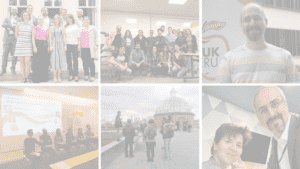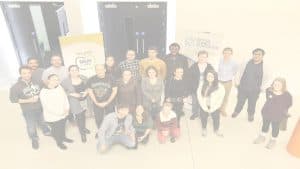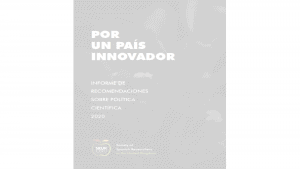As researchers, we are in constant evolution and learning process. We invest our lives in becoming experts on the field we are passionate about. We love new things. We love discovery, yet a lot of people (myself included) would never imagine changing fields in the middle of a career path. I am a molecular neuroscientist. I have been dissecting the basis of chronic pain for the last two years. Nevertheless, I had previously been working in a biochemistry lab and, before that, I completed my PhD research on the mechanisms of DNA replication in yeast. Yes, in yeast. Those little organisms that help us make beer and bread! In this post, I will take you through my personal experience when changing fields in research while dissecting its pros and cons (like everything in life).
There are certain questions I asked myself in those particular moments of professional change in my life:

Image source: Pinterest.
Do you really like what you are doing?
For me, this was not the first decision-making point. I loved every single moment of my PhD. I loved the topic, the techniques, and the lab; which is crucial when doing research. Nevertheless, the extra hours of work involved may lead to sacrifices in our personal life. If we cannot do something with which we feel fulfilled, we might want to consider other options.
How to choose where to move to?
As many researchers know, building a career doing the exact same thing that your boss does is very difficult. “You need to find a new niche!”, they say. My logic and my supervisor’s advice were: “you can either use your technical expertise in another field or stay in the field but learn new techniques”. I chose the latter. I really love learning new techniques, so I took a postdoctoral research position on DNA replication but, this time, I was focusing on the biochemistry behind it, instead. Hard-core biochemistry.
Accept that the change will be difficult and give yourself time to adapt
This is where my ideal plan stumbled. Taking the leap for a change is difficult, but acknowledging how much help you will need is even more. I knew it would take me some time to learn new techniques – and so did my new supervisor. Nevertheless, none of us realized transitions are like marathons, not sprints. After several months, I started doubting myself, and my supervisor, a new PI, was not ready for this challenge. I left the lab because I ended up not enjoying what I was doing. And, as I said before: enjoying what one is doing is crucial.
Get personal and honest
When I was lab hunting again, I went back to look for a lab in the field of DNA replication which used similar techniques to those I was familiar with. I got several interviews and got offered a couple of positions. However, I wasn’t really feeling it. Then, I remembered my family’s advice about “finding my own pain killers”, therefore I decided to look for labs investigating chronic pain, a disease I have been living with for years. I contacted all labs I knew were working on that research field, regardless they were advertising for postdoc positions or not. I contacted them all. When writing my applications, I could not be more personal and honest: “Look, I have no idea about neuroscience, but I will strive to do my best, I’ll give my 200% and make it count”. After several rejections, I got an informal meeting in one of the best research labs in the field!

Image source: Twitter.
Plan the transition and be patient
What I learnt from my previous experiences was that I wasn’t going to be shy to ask for help and to plan my transition for new fields. Even in the first interviews, I made it very clear: I wouldn’t take a position if I didn’t have access to strong mentoring and supervision at least for the first year. This point was very hard. Probably, the hardest part of the whole process. I am a very independent person who struggles asking for help (who doesn’t?), so this really took me back to Earth.
Be patient!
I know that I mentioned this point before, but this consideration needs to be emphasised. Be patient with yourself and be patient with the project. In the end, it is like doing another PhD, but hopefully knowing a bit more about the perks of it! Once I got into the loop of asking for help and cutting me some slack, I finally found my place! I worked hard and I had (still have) a lot of support. Now, I call myself a neuroscientist. Not only have I seen how much I have improved in the last two years, but also how much I can still improve. That is the essence of research to me. So, what else can I ask for?
Some extra tips I learnt on the way:
* Think about what you have to offer. Every expertise is welcome in research, even in a very different topic from what you are used to. Give yourself credit and value. In the end, no once can bridge between those fields but you! In the era of collaborative research andinterdisciplinary projects, you will be an invaluable asset knowing about different fields.
* Think about what you lack and invest in potential courses, webinars, undergrad workshops… Anything that you can do before/while starting a new position.
* At the interview, try to own what you know and show it. You are not going to be the go-to candidate, so you must distinguish yourself. Don’t be afraid of asking about anything and, if you are not convinced about the position, keep searching!
* Be sure your supervisor is on the same page as you are. At a certain point in the path, you will forget how worthy your expertise is, and you will need you supervisor’s help and support to get you back on track!
After some years, I am proud to still say that I am very happy with my change, and very grateful for not having settled for a position where I couldn’t find myself enjoying the job. It is difficult, yes. It is scary, yes. But it is your life. I encourage you to consider every possible option (and even the impossible ones!) if you feel you need a change, even if after some months of trying that ‘perfect’ position that you got turned out not to be ‘that perfect’ for you. We are all different and every laboratory and every team are great for someone around. Don’t be afraid to look for the one that is perfect for you!
* * *
By Sara Villa Hernandez (@VillaScience), Postdoctoral Research Associate at King’s College London.
More information:






